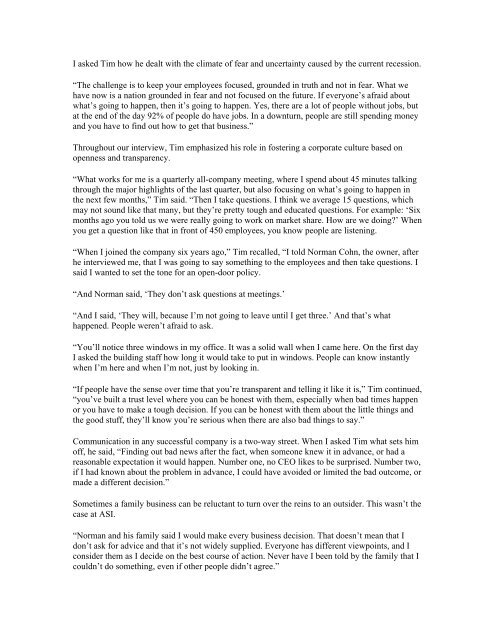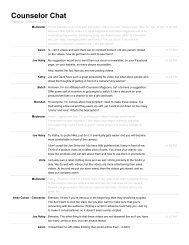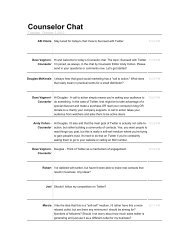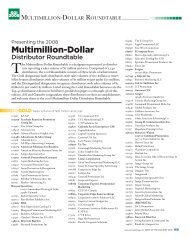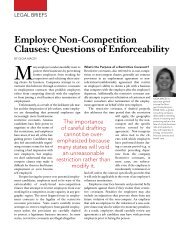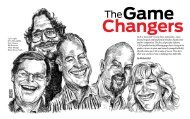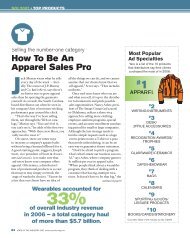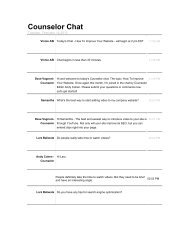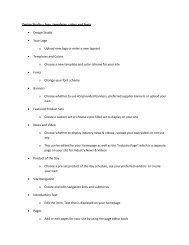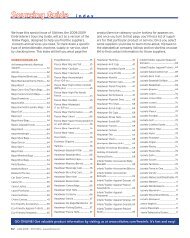The following is an excerpted chapter from “Wisdom at the Top ...
The following is an excerpted chapter from “Wisdom at the Top ...
The following is an excerpted chapter from “Wisdom at the Top ...
You also want an ePaper? Increase the reach of your titles
YUMPU automatically turns print PDFs into web optimized ePapers that Google loves.
I asked Tim how he dealt with <strong>the</strong> clim<strong>at</strong>e of fear <strong>an</strong>d uncertainty caused by <strong>the</strong> current recession.<br />
“<strong>The</strong> challenge <strong>is</strong> to keep your employees focused, grounded in truth <strong>an</strong>d not in fear. Wh<strong>at</strong> we<br />
have now <strong>is</strong> a n<strong>at</strong>ion grounded in fear <strong>an</strong>d not focused on <strong>the</strong> future. If everyone’s afraid about<br />
wh<strong>at</strong>’s going to happen, <strong>the</strong>n it’s going to happen. Yes, <strong>the</strong>re are a lot of people without jobs, but<br />
<strong>at</strong> <strong>the</strong> end of <strong>the</strong> day 92% of people do have jobs. In a downturn, people are still spending money<br />
<strong>an</strong>d you have to find out how to get th<strong>at</strong> business.”<br />
Throughout our interview, Tim emphasized h<strong>is</strong> role in fostering a corpor<strong>at</strong>e culture based on<br />
openness <strong>an</strong>d tr<strong>an</strong>sparency.<br />
“Wh<strong>at</strong> works for me <strong>is</strong> a quarterly all-comp<strong>an</strong>y meeting, where I spend about 45 minutes talking<br />
through <strong>the</strong> major highlights of <strong>the</strong> last quarter, but also focusing on wh<strong>at</strong>’s going to happen in<br />
<strong>the</strong> next few months,” Tim said. “<strong>The</strong>n I take questions. I think we average 15 questions, which<br />
may not sound like th<strong>at</strong> m<strong>an</strong>y, but <strong>the</strong>y’re pretty tough <strong>an</strong>d educ<strong>at</strong>ed questions. For example: ‘Six<br />
months ago you told us we were really going to work on market share. How are we doing?’ When<br />
you get a question like th<strong>at</strong> in front of 450 employees, you know people are l<strong>is</strong>tening.<br />
“When I joined <strong>the</strong> comp<strong>an</strong>y six years ago,” Tim recalled, “I told Norm<strong>an</strong> Cohn, <strong>the</strong> owner, after<br />
he interviewed me, th<strong>at</strong> I was going to say something to <strong>the</strong> employees <strong>an</strong>d <strong>the</strong>n take questions. I<br />
said I w<strong>an</strong>ted to set <strong>the</strong> tone for <strong>an</strong> open-door policy.<br />
“And Norm<strong>an</strong> said, ‘<strong>The</strong>y don’t ask questions <strong>at</strong> meetings.’<br />
“And I said, ‘<strong>The</strong>y will, because I’m not going to leave until I get three.’ And th<strong>at</strong>’s wh<strong>at</strong><br />
happened. People weren’t afraid to ask.<br />
“You’ll notice three windows in my office. It was a solid wall when I came here. On <strong>the</strong> first day<br />
I asked <strong>the</strong> building staff how long it would take to put in windows. People c<strong>an</strong> know inst<strong>an</strong>tly<br />
when I’m here <strong>an</strong>d when I’m not, just by looking in.<br />
“If people have <strong>the</strong> sense over time th<strong>at</strong> you’re tr<strong>an</strong>sparent <strong>an</strong>d telling it like it <strong>is</strong>,” Tim continued,<br />
“you’ve built a trust level where you c<strong>an</strong> be honest with <strong>the</strong>m, especially when bad times happen<br />
or you have to make a tough dec<strong>is</strong>ion. If you c<strong>an</strong> be honest with <strong>the</strong>m about <strong>the</strong> little things <strong>an</strong>d<br />
<strong>the</strong> good stuff, <strong>the</strong>y’ll know you’re serious when <strong>the</strong>re are also bad things to say.”<br />
Communic<strong>at</strong>ion in <strong>an</strong>y successful comp<strong>an</strong>y <strong>is</strong> a two-way street. When I asked Tim wh<strong>at</strong> sets him<br />
off, he said, “Finding out bad news after <strong>the</strong> fact, when someone knew it in adv<strong>an</strong>ce, or had a<br />
reasonable expect<strong>at</strong>ion it would happen. Number one, no CEO likes to be surpr<strong>is</strong>ed. Number two,<br />
if I had known about <strong>the</strong> problem in adv<strong>an</strong>ce, I could have avoided or limited <strong>the</strong> bad outcome, or<br />
made a different dec<strong>is</strong>ion.”<br />
Sometimes a family business c<strong>an</strong> be reluct<strong>an</strong>t to turn over <strong>the</strong> reins to <strong>an</strong> outsider. Th<strong>is</strong> wasn’t <strong>the</strong><br />
case <strong>at</strong> ASI.<br />
“Norm<strong>an</strong> <strong>an</strong>d h<strong>is</strong> family said I would make every business dec<strong>is</strong>ion. Th<strong>at</strong> doesn’t me<strong>an</strong> th<strong>at</strong> I<br />
don’t ask for advice <strong>an</strong>d th<strong>at</strong> it’s not widely supplied. Everyone has different viewpoints, <strong>an</strong>d I<br />
consider <strong>the</strong>m as I decide on <strong>the</strong> best course of action. Never have I been told by <strong>the</strong> family th<strong>at</strong> I<br />
couldn’t do something, even if o<strong>the</strong>r people didn’t agree.”


